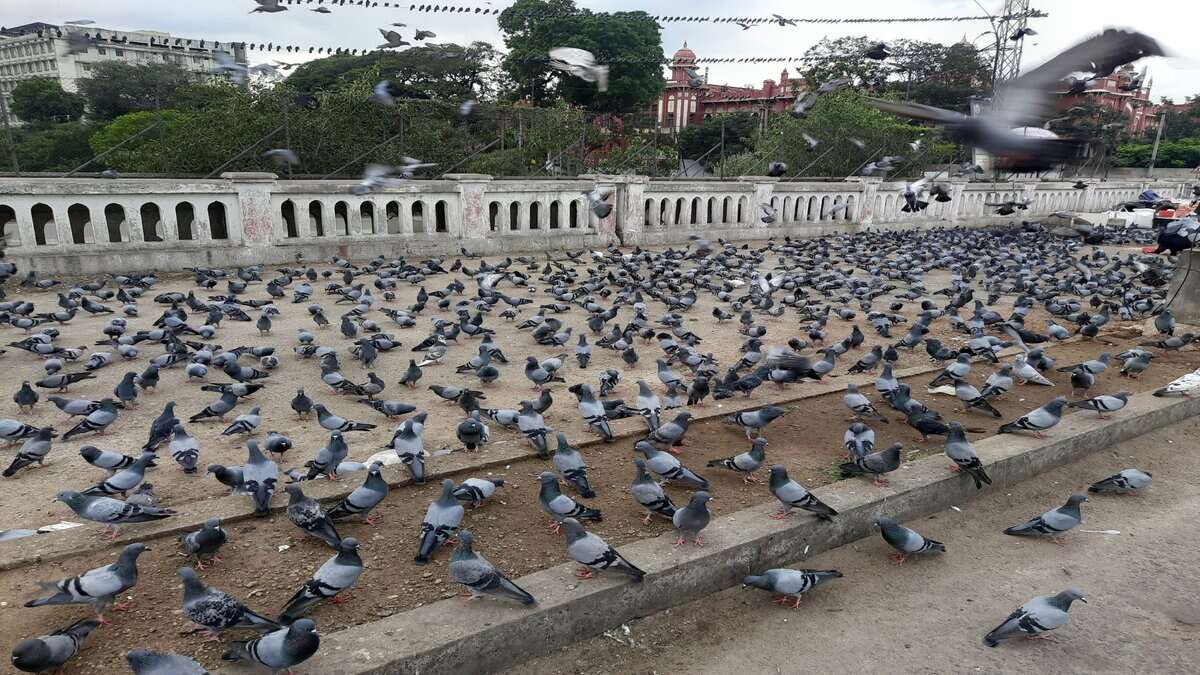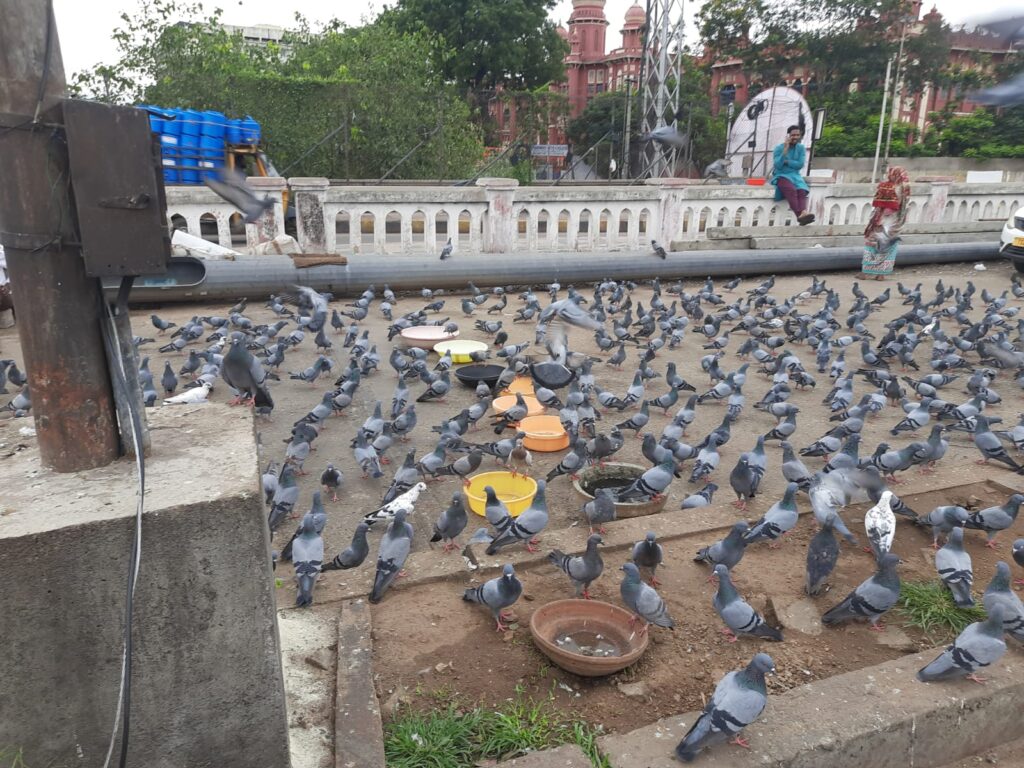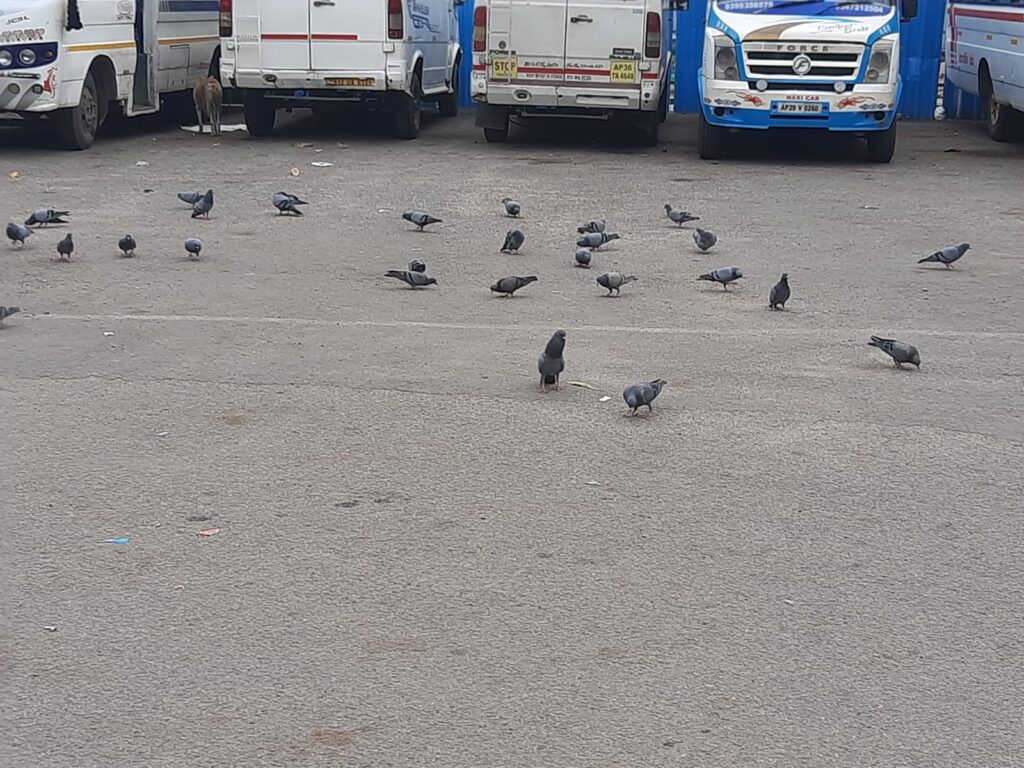
Hyderabad: Health officials in Hyderabad have urged the public to avoid contact with pigeons amid growing health hazards that could be caused by the birds.
Following public complaints, the Hyderabad District Medical Health Officer (DMHO) Venkat Jummidi acknowledged that unchecked pigeon populations in crowded areas could contribute to the spread of zoonotic infections. Scientific research papers suggest that pigeons are carriers of zoonotic diseases (which are transmitted to human beings).
Zoonotic diseases include illnesses associated with bacteria, viruses, endo and ectoparasites, fungi and protozoa. Many of these diseases can lead to debilitating and life-threatening ailments. Such diseases are either airborne or transmitted through alimentary routes.
According to a report by Innolytics, a US-based company which focuses on birth control for birds, pigeons can cause diseases which are transmitted under a specific set of conditions.
“Immune-compromised patients, children, and the elderly are at more risk than a normal healthy person,” the report said.
In Hyderabad, some places, including the Nampally Railway Station, Nampally Metro Station and the Musallam Jung Bridge, are hotspots where pigeons are found in large numbers. Siasat.com reached out to the public to understand whether people are aware of the health hazards caused due to pigeons.

“I don’t see an issue with pigeons, I feed them once in a while before taking the metro,” Shankar, a regular commuter through the Nampally Metro Station, told Siasat.com. It is to be noted that the staff at the Metro station, which is mostly busy cleaning, have raised concerns over pigeon droppings.
“Most of the time, we are busy cleaning pigeon droppings, which are found on the railings of the staircases. It defaces the station and makes the premises stinky,” said one of the staffers at the metro station.

Some passengers and auto drivers arriving at the Nampally Railway Station were seen feeding pigeons. Sai Kumar, an auto driver, said, “There are a lot of people who feed pigeons here. I do that too, once in a while.” However, there seemed to be no other reason apart from that for him.
Asked whether he has experienced any health issues due to the pigeons on the station’s premises, Kumar said that he hasn’t experienced any difficulty as such. Ajay Yadav, a passenger who was departing the station, was seen feeding pigeons. “I just feed pigeons out of love and nothing else,” he said. It must be noted that there exists a nation among some that feeding pigeons can bring good luck.
At the Mussalm Jung Bridge in the Old City, visitors and hawkers were seen feeding pigeons. It is to be noted that a large number of pigeons flock to the bridge throughout the day. Ali Ahmed, who was at the bridge with his family, said, “I just wanted to show pigeons to my son. We stopped by for him to spend some time.”

Asked if he was aware of the health hazards caused by pigeons, Ahmed said he wasn’t really concerned about it since he was there for a short while. Prem Kumar, who visited the spot along with his family, said, “I got my child here just to spend some time and take a few pictures. We fed a few pigeons.”
Saleem Shaikh, a chana vendor who has been visiting the bridge for the past 20 years to sell the gram, said, “I have been coming here for the past two decades. I have seen most people spend some time feeding the pigeons and leave.” Asked if he has experienced any health issues due to the pigeons, Shaikh said, “No, I don’t have any infection as of now. What can pigeons do?”
Another visitor, Padma Devi, was seen placing grains for pigeons at the corner of the bridge. Asked if she does it for religious reasons, Devi said, “There is no religious purpose to it, I feed them out of love, and it makes me happy.”
Most people visiting the Musallam Jung bridge came with families and indulged in photography sessions.
Doctors advise avoiding pigeons
Speaking to Siasat.com, Hyderabad District Medical Health Officer (DMHO) Venkat Jummidi said that pigeons cause health hazards such as respiratory issues. He advised the public to avoid contact with pigeons.
“Pigeon droppings cause bronchitis and respiratory issues. People must refrain from feeding pigeons,” he said. The DMHO suggested that people prevent the pigeons from entering their houses by covering windows using mesh.
Elaborating on health hazards caused by pigeons, Hyderabad-based neurologist Dr Sudhir Kumar said, “Pigeon droppings contain fungi and bacteria that can cause serious respiratory illnesses like histoplasmosis, cryptococcosis, and psittacosis. One of the lesser-known conditions linked to chronic exposure is ‘Pigeon Breeder’s Lungs’.”
Kumar further explained that a hypersensitivity reaction can lead to severe lung inflammation.
Moreover, the presence of parasites like mites and ticks in pigeon nests can further exacerbate health risks, especially for the elderly, children, and people with compromised immunity.
Religious and cultural roots
Speaking of the religious and cultural angle associated with pigeon feeding, the neurologist said that feeding pigeons has deep cultural and religious roots in India. Many Hindus consider it an act of charity (daan), especially during specific days like Saturdays or the lunar fortnight of Shraddha. In some Jain and Sufi traditions, feeding birds symbolises compassion and spiritual merit.
“However, this practice, when done indiscriminately in public spaces, leads to overpopulation and dependency among pigeons, upsetting urban biodiversity,” he added.
Bombay High Court’s order
The concern over pigeons has surged in Hyderabad after the Bombay High Court, on July 15, stopped the Brihan Mumbai Corporation (BMC) from demolishing “Kabutar Khanas” in Mumbai amid growing health concerns.
On July 24, the Bombay High Court observed that there cannot be anything more vital than human health, and if any hazard is caused due to the congregation of pigeons at such areas, it is a “matter of grave social concern.”
The court sought, within two weeks, the medical material and opinion of an expert doctor from Bombay Hospitals over health hazards created by Kabutar Khanas, along with an affidavit from the Brihanmumbai Municipal Corporation (BMC) over the same after consultation with expert doctors from its hospitals. It continued an interim order of not demolishing heritage Kabutar Khanas and also directed the BMC employees not to use firecrackers to disperse pigeons at such feeding areas.
“Inasmuch as the decision of BMC is taken in the larger interest of societal health, it includes all categories of persons from children to senior citizens, we need to consider such issues as paramount and directly affecting life and livelihood under Article 21 of the Constitution,” the HC noted.
While restraining the BMC from demolishing the Kabutar Khanas, the court has also restricted the twice-daily feeding of pigeons, as requested by the petitioners, citing the BMC’s concern for public health. It is to be noted that the civic body imposed a penalty of Rs 500 for feeding pigeons.
According to reports, the BMC penalised 107 people for violating the order and collected Rs 55,700 between July 3-12.


